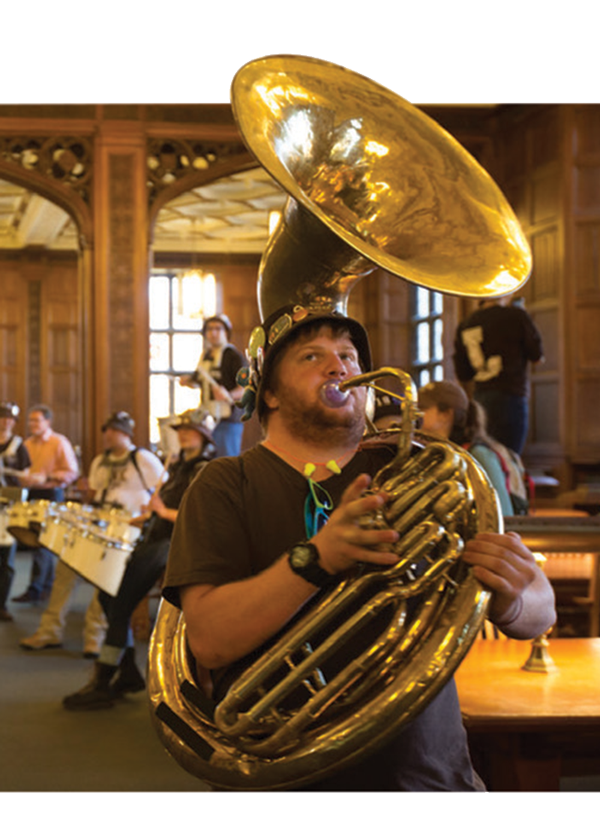
Charting your course
Students begin their first year in the Rossin College without formally declaring a major. While some engineering schools require an upfront selection, we give you the time and exposure to make an informed and fulfilling choice.
Most engineering students take the same courses in their first year. You'll get to know your peers, participate in a wide variety of activities—some that relate to engineering, others that broaden your perspective—and become more familiar with your academic and vocational choices.
In addition to guidance from your academic advisor, you'll also receive mentoring and support from our college's student-ambassadors, the Rossin Junior Fellows, as well as Lehigh's Mentor Collective. Both of these groups link incoming engineering students with current engineers for help in selecting a major and navigating the variety of associated opportunities for Lehigh engineers.
Academics in the first year
All engineering majors—except IBE, IDEAS, and CSB—share a first-year curriculum that includes the following courses: (Please note that your specific course selection may be different if you have AP or transfer credit.)
Calculus I (MATH 21): Functions and graphs; limits and continuity; derivative, differential, and applications; indefinite and definite integrals; trigonometric, logarithmic, exponential, and hyperbolic functions
Calculus II (MATH 22): Applications of integration; techniques of integration; separable differential equations; infinite sequences and series; Taylor's Theorem and other approximations; curves and vectors in the plane
Note: All students entering the Rossin College are required to take the ALEKS exam for placement in MATH 021. The results of this exam may place you in a different Calculus course than the ones listed. ALEKS will be available on the First Year Enrollment website or by navigating directly to go.lehigh.edu/aleks.
Chemistry (CHM 30): Atomic structure, properties of matter, chemical reactions, energy, structure and bonding in organic and inorganic compounds
Physics I + Lab (PHYS 11 & PHYS 12): Kinematics, frames of reference, laws of motion in Newtonian theory and in special relativity, conservation laws, as applied to the mechanics of mass points; temperature, heat and the laws of thermodynamics; kinetic theory of gases
Introduction to Engineering Practice (ENGR 005): Problem solving, design, project planning, communication, teamwork, ethics and professionalism; innovative solution development and implementation. Introduction to various engineering disciplines and degree programs.
Applied Engineering Computer Methods (ENGR 010): Use of Python to program and solve engineering problems; interfacing sensors and actuators to a microcontroller board and programming to interact with the world
Academic and Analytical Writing (WRT 001): Introduction to academic writing, specifically analytical writing and essays that support claims in respectful conversation with other writers and thinkers. The course is centered on writing as a social process and provides focused instruction and ample practice in synthesis and analysis; collaboration and peer feedback; revision; and the conventions of college writing.
Research and Argument (WRT 002): Designed to refine the skills of argument and research. Students will make persuasive, thoughtful, and well-supported arguments in a variety of forms, including multimodal genres. The course provides a number of occasions to think, research, and write about pressing issues of public concern.
Note: Students with AP credit in English may be advised to take WRT 002. International students may be advised to take WRT 003.
Principles of economics (ECO 001): Supply and demand; pricing and production decisions of firms; the role of government in the economy; the determination of national income; money and banking; monetary and fiscal policy; and government finance.
An elective can be chosen based on the student's academic record and personal interests.
Helping to get you up to speed
In addition to having a formal academic advisor, you'll also benefit from peer mentoring and support. Lehigh creates pods of 15 to 18 first-year students, each guided by upper-class students. In the Fall, returning students offer 'registration office hours,' providing you important advice for selecting and enrolling in second semester classes. Then, in the Spring, the College hosts 'Explore the Majors,' which is an event to further highlight your options and engage with faculty and students in disciplines of interest.
And even though it may be your first year, it is never too early to begin talking to faculty and peer mentors about opportunities that will emerge later in your college career. Life-changing experiences such as...
- Studying abroad. Lehigh encourages engineering students to take advantage of study abroad programs. Your advisor can help you identify programs that may be a good fit.
- Choosing a minor. Lehigh encourages all students to pursue a broader, more cross-disciplinary approach.
- Conducting research. At Lehigh, you don't need to be a grad student to participate in—and benefit from—research projects. You can begin working in our facilities and alongside our world-renowned faculty very early in your career.
- Landing an internship or co-op. Lehigh has long maintained close ties to industry—giving you ample opportunities to get hands-on, real world experience through optional internships or co-ops, most of them as paid positions. Unlike many co-op programs, Lehigh's program structure allows qualifying students to gain work experience and still graduate in four years.
By the end of your first year, you'll have a good sense for how things work—and what you'd like to pursue, with an academic plan in place and clear direction toward a meaningful experiential learning portfolio.



